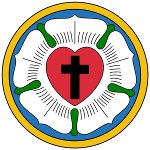Presentation of the Augsburg Confession Date in the current year: June 25, 2026
 June 25 is traditionally celebrated by Lutherans as the Presentation of the Augsburg Confession. It commemorates the primary confession of faith of the Lutheran Church and one of the most important documents of the Lutheran Reformation.
June 25 is traditionally celebrated by Lutherans as the Presentation of the Augsburg Confession. It commemorates the primary confession of faith of the Lutheran Church and one of the most important documents of the Lutheran Reformation.The Protestant Reformation in Europe was initiated by German theologian Martin Luther. It is believed to have started on October 31, 1517, when Luther posted his Ninety-five Theses on the door of All Saints’ Church in Wittenberg and sent a copy to the Archbishop of Mainz. Although the Reformation started as a movement to reform the Catholic Church, it eventually led to a schism in Western Christianity and the emergence of new confessions.
In an attempt to reconcile Catholics and Protestants in the face of the imminent Turkish invasion, the Holy Roman Emperor Charles V initiated the 1530 Diet of Augsburg. On June 25, 1530, participating Lutherans presented the so-called Augsburg Confession (Confessio Augustana). The document was written primarily by Luther’s collaborator Philip Melanchthon and described the normative principles of Christian faith held by the Lutherans.
The Confession was rejected by the Emperor, which led to the Schmalkaldic War between the Holy Roman Empire and the Lutheran Schmalkaldic League. Charles V and the Schmalkaldic League signed a peace treaty in 1555. It officially ended the religious struggle and recognized Lutheranism as one of the state religion. The definition of Lutheranism in the peace treaty was based on the Augsburg Confession.
- Category
- Religious Holidays
- Tags
- Presentation of the Augsburg Confession, religious observances, Lutheran observances, Protestant Reformation, Diet of Augsburg